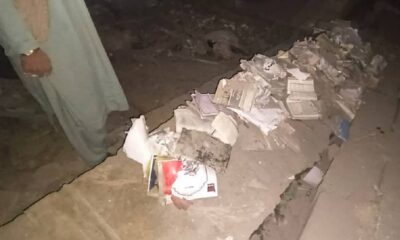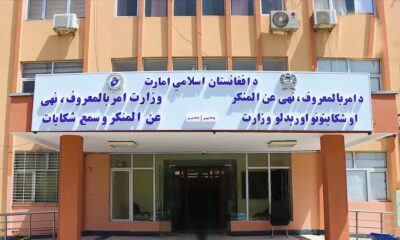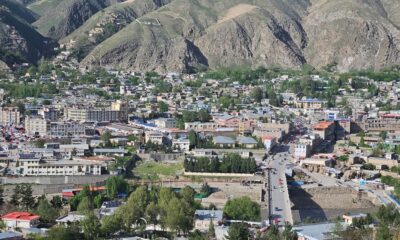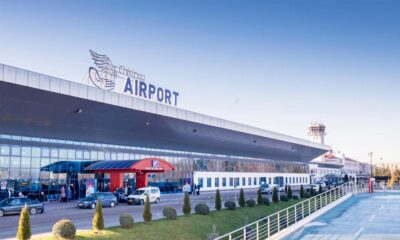Business
ADB report states 70% of Afghan transit trade diverted through Iran
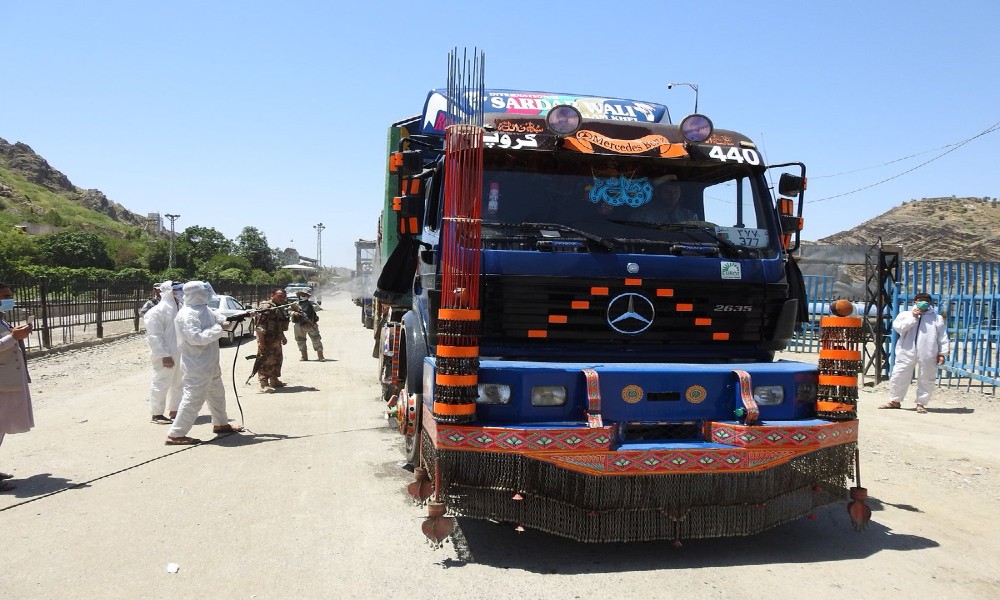
The Asian Development Bank (ADB) said in a recent report that although Afghanistan has traditionally relied on Pakistan as a gateway to international shipping routes, recent trends indicate that 70 percent of Afghan transit trade is now diverted through Iran.
The ADB’s Corridor Performance Measurement and Monitoring (CPMM) Annual Report 2019, published this week, stated that Pakistan is still facing challenges in terms of removing barriers for road transport.
This shift away from Pakistan has been driven by lower costs from foreign ports and more attractive security deposit and detention tariffs for transit containers from shipping lines that operate at Iran’s seaports.
The report stated that in addition, diesel fuel in Iran ($0.06 per liter) is significantly less expensive than in Pakistan ($0.86 per liter), which provides an additional edge in terms of cost competitiveness.
Also, in the absence of a formal agreement with Pakistan, shippers and carriers face uncertainty in transit procedures, it added.
The report further stated that the CPMM trade facilitation indicator (TFIs) reported longer average border-crossing time, although relatively unchanged average border-crossing cost.
Total average transport cost showed an improvement, but both measures of speeds showed that trucks did not move as fast compared to 2018. The average border-crossing time between Afghanistan and Pakistan increased to 38.2 hours.
The time to cross Chaman was 60.1 hours, ranked as the most time-consuming border crossing point in 2019.
Peshawar took 45.8 hours and ranked the third most time-consuming, the report stated.
These samples were estimated from commercial shipments carrying goods destined for Afghanistan as well as Central Asia.
Following the approval of its National Transport Policy in 2018, Pakistan embarked on a series of reforms and initiatives to address structural inefficiencies and impediments, to increase exports through lowering cost and lead time of transportation.
The report recommended the implementation of the national single-window system and port community system (PCS) to reduce cargo dwell time in seaports.
It said better parking area design and queuing systems could improve efficiency and speed up border crossing.
Pakistan does not yet have a domestic regulation on the international carriage of goods on road, which is a fundamental condition to implement the Carriage of Goods by Road (CMR).
The report also stated that greater adoption of freight on rail and inland waterways would reduce freight costs and boost low-unit value exports such as agricultural produce.
Afghanistan and Pakistan have however reactivated talks on the Afghanistan–Pakistan Transit Trade Agreement 2010, which aims to attract transit from Central Asia to seaports south of Pakistan, the report stated.
Business
Pakistan allows re-export of stranded Afghan transit cargo
The suspension of Afghan Transit Trade operations left thousands of containers stuck, causing heavy financial losses for Afghan traders and disrupting regional commerce.

Pakistan’s Federal Board of Revenue (FBR) has allowed the re-export of Afghan transit trade consignments that had been stranded for months at Chaman and Quetta, enabling their movement to Karachi Port and Port Qasim.
The shipments were halted after crossings between Afghanistan and Pakistan were closed in October 2025 amid escalating security tensions.
The suspension of Afghan Transit Trade operations left thousands of containers stuck, causing heavy financial losses for Afghan traders and disrupting regional commerce.
Under the new directive, stranded goods will be transported under customs supervision to Karachi for re-export. Pakistani authorities said the process will follow strict monitoring and inspection procedures to ensure compliance with transit regulations.
The decision offers limited relief to Afghan businesses affected by the prolonged disruption, though regular trade between the two countries has yet to resume.
Business
Afghanistan’s 2026 Development Framework meeting highlights self-reliance and economic stability
The Ministry said these measures helped preserve relative economic stability and deliver stronger economic growth compared with the previous year.
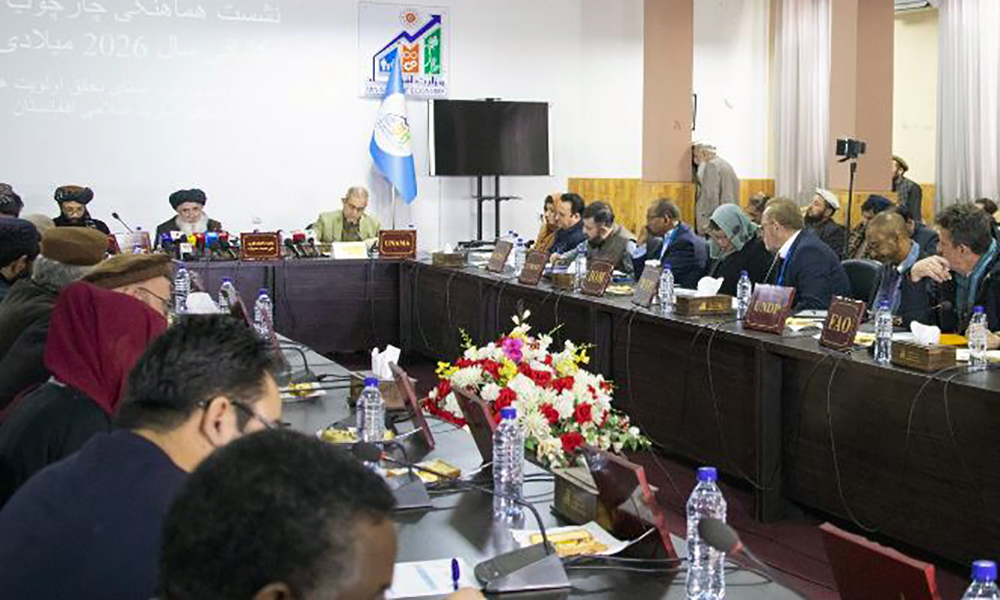
The Ministry of Economy of Afghanistan says a coordination meeting on the United Nations’ 2026 Development Framework for Afghanistan was held under the chairmanship of Qari Din Mohammad Hanif, Minister of Economy, focusing on advancing national development priorities and long-term economic stability.
The meeting was attended by representatives from the Ministry of Foreign Affairs, the United Nations Assistance Mission in Afghanistan (UNAMA), heads of UN agencies operating in the country, delegates from the European Union, and a range of international organizations.
During the session, the Minister of Economy outlined Afghanistan’s current situation, recent achievements, and key economic priorities, while expressing appreciation for the continued support of international partners during challenging years.
According to the Ministry, Afghanistan faced severe economic, social, and climate-related pressures in 2025.
These included the impacts of climate change and natural disasters, the forced return of more than two million Afghan migrants from neighboring countries, ongoing sanctions, frozen foreign reserves, and a sharp decline in development and humanitarian assistance. Together, these factors have significantly affected the livelihoods of vulnerable communities.
Despite these challenges, the Islamic Emirate has implemented a series of economic and development programs centered on prudent policymaking and national priorities.
The Ministry said these measures helped preserve relative economic stability and deliver stronger economic growth compared with the previous year.
Improved economic governance, support for domestic production and the private sector, exchange rate stability, export growth, national infrastructure projects, inflation control, and increased domestic revenues were cited as key contributors.
The Ministry also highlighted the role of the United Nations in addressing urgent humanitarian needs, noting that UN assistance has been critical in responding to climate impacts, supporting migrants and returnees, strengthening food security and livelihoods, delivering basic health services, and reducing overall human suffering.
Data from the Ministry of Economy show that around $1.009 billion in international assistance was allocated to Afghanistan in 2025 across various sectors, with approximately $590 million earmarked for project expenditures. However, figures from the UN Office for the Coordination of Humanitarian Affairs indicate a significant drop in humanitarian funding, with only 36 percent of the $2.4 billion required having been secured.
The Ministry emphasized that sustainable economic stability can only be achieved through self-reliance, growth-driven economic policies, and constructive engagement with the international community.
Afghanistan’s Development Strategy, a long-term framework developed under the leadership of the Economic Deputy of the Prime Minister and coordinated by the Ministry of Economy, aims to promote balanced development, job creation, poverty reduction, infrastructure expansion, private sector support, and environmental protection.
Business
Afghan delegation visits Belarus to strengthen economic and industrial ties
The delegation also visited major state and industrial enterprises, including, the State Chemical Service, and agricultural farms under the Ministry of Agriculture.
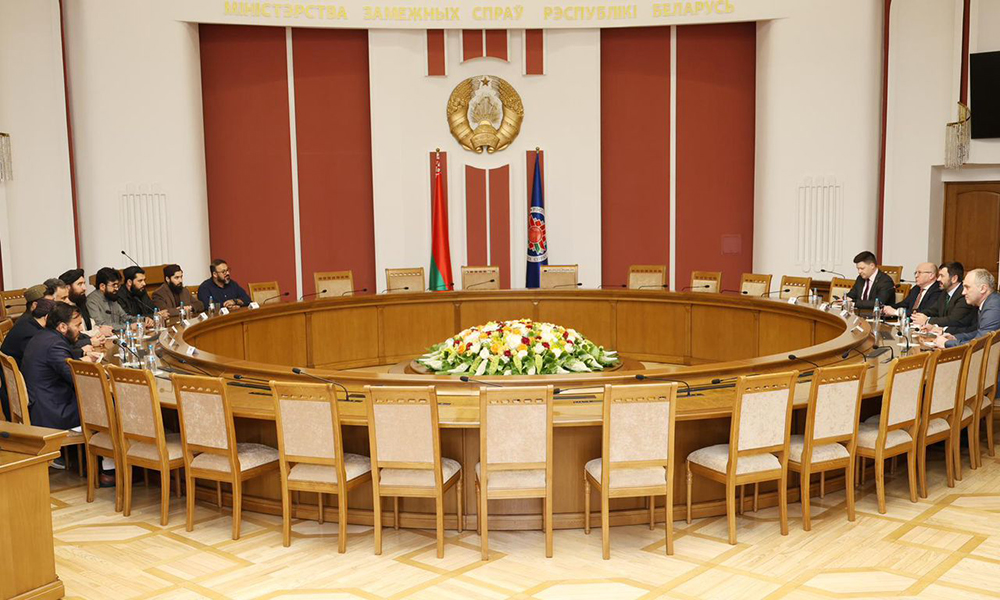
A high-level delegation from the Islamic Emirate of Afghanistan, led by Ahmad Jan Balal, head of the Emirati Companies, and Abdul Rahman Atash, CEO of the National Development Company, accompanied by representatives from the Ministry of Foreign Affairs and technical teams, visited Belarus to advance bilateral cooperation.
According to Nabiullah Arghandiwal, spokesperson for the National Development Company, the Afghan delegation held meetings with officials from Belarus’ Ministries of Foreign Affairs, Agriculture, and Industry to discuss political, economic, and trade-related issues.
The delegation also visited major state and industrial enterprises, including, the State Chemical Service, and agricultural farms under the Ministry of Agriculture.
Arghandiwal added that both sides agreed to strengthen and expand technical collaboration in the fields of industry, agricultural machinery, construction materials, food safety, public health, and education, aiming to enhance long-term economic and industrial partnerships between the two nations.
give me english hashtags with coma in between the words
-

 Latest News5 days ago
Latest News5 days agoIEA releases three Pakistani soldiers to mark Ramadan
-

 Latest News4 days ago
Latest News4 days agoAfghanistan’s Chief of Armed Forces underscores readiness and equipment for national defense
-
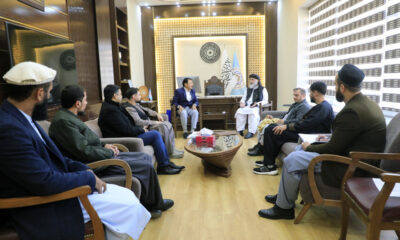
 Latest News3 days ago
Latest News3 days agoAfghanistan welcomes investment and technology partnerships with India
-

 Latest News5 days ago
Latest News5 days agoGrateful to Afghans and Ulama for obeying the Islamic Emirate, says Hibatullah Akhundzada
-

 Sport3 days ago
Sport3 days agoAfghan Peaks founder climbs Aconcagua to promote Afghanistan’s mountain potential
-

 Latest News2 days ago
Latest News2 days agoIndian customs seize Chinese walnuts falsely declared as Afghan
-

 Business3 days ago
Business3 days agoPakistan allows re-export of stranded Afghan transit cargo
-
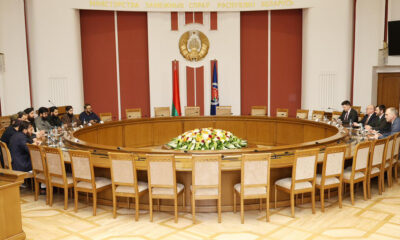
 Business5 days ago
Business5 days agoAfghan delegation visits Belarus to strengthen economic and industrial ties


